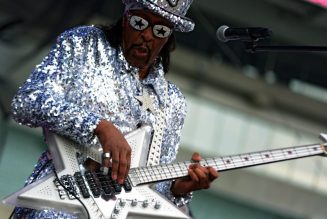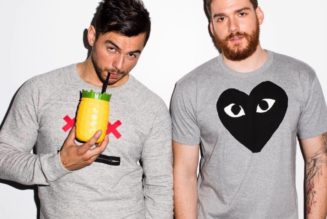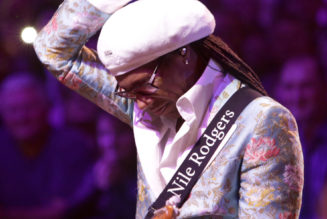Veteran producer ill.GATES has established himself as a vital figure in the bass community, consistently using his music and platform to help artists learn and do more. However, while working in the studio last week, ill.GATES, A.K.A. Dylan Gates, found himself in a position where he was admittedly afraid to speak up.
“I’d been taking a break from the news when everything popped off,” Gates told EDM.com amid current nationwide protests in the wake of George Floyd’s death at the hands of a police officer. “The day [of Floyd’s death,] I wasn’t really online much [because] I was focusing on my work,” said Gates. “[My friend Joy] called me up and basically said, ‘Dylan, you have all these political samples in your music, but you’re not using your voice on social media. You’re not going to the protests. Must be nice to be white.’”
Whereas his focus was on creating music before, Gates conceded that it was his privilege to have avoided the conflict from the start. “People of color do not have the luxury of neutrality on these issues,” he asserted.
In addition to participating in the sweeping music industry blackout on Tuesday, June 2nd, 2020, Gates swiftly responded by “activating” his entire Producer Dojo, a label and producer platform that empowers artists to learn more about their craft and market their own music. After meeting with his team of artists, he realized the group needed to empower more Black musicians and voices, like Colorado-based artist A Hundred Drums.
Ultimately, the group came up with a four step plan of action: incorporating history classes into Gates’ The Weekly Download workshop series, normalizing the presence of people of color and females in the Dojo community, releasing politically charged mixtapes, and to develop “conversation starter packs” featuring culturally curated samples to educate producers and listeners.
Like a vast number of his fellow producers, Gates found himself in a precarious situation with a scheduled release in the midst of a nationwide racial crisis. The track, “Trapezoid,” which earned a co-sign from Bassnectar, is the lead single off The Arrival, Gates’ first LP in nearly three years. A perfect representation of Gates’ place in the modern EDM spectrum. the 3-minute trap and bass hybrid oozes the dynamic flavors of classic dubstep and fuses them with more contemporary bass sonics, which in part comes from collaborator and Dojo student UHNK.
“We got really lucky with Trapezoid,” said Gates. “It was one of the magic studio days where everything goes right and it all just comes together in one afternoon. The RiFF RAFF sample just set us on the right path and then it was nothing but net from there on out.”
Gates has pledged to direct all proceeds from “Trapezoid,” which was released on June 12th, 2020, to the American Civil Liberties Union (ACLU) through his Bandcamp page. Fans can support ill.Gates and his Dojo Family via Patreon or check out the Dojo by visiting their official website.
Following the release, EDM.com spoke with ill.Gates in a wide-ranging Q&A about racial injustice, his forthcoming headline slot at SummerEyes Digital Festival, and the premiere of the official music video for “Trapezoid,” which you can watch below.
EDM.com: Trapezoid” is a collaboration with Producer Dojo student UHNK. What can you say about him and what was it like working with a student on a release?
ill.GATES: UHNK is a wonderful person, we get along well at a human level and I’m proud to call him my friend. He’s intelligent, skilled and curious and he loves bass music with every fiber of his being. We spent almost the entirety of Deja Voom hanging out together and had many deep conversations at the festival. It’s been incredible to see his music get such an immediate reaction from the music community and I am in full support of his project.
It’s so crazy that when he came to Producer Dojo, he had never really written music before. He’d messed around in a DAW and he had listened to all kinds of music over the years, but having never sat down to write, he was like this beautiful blank slate without any of the preconceptions and bad habits that I often have to spend years helping people to unlearn. He has an open and receptive mind when it comes to training and lacks the ego-driven blockage that holds so many producers back from their potential.
His real breakthrough came when he travelled to the Dojo HQ in LA to train with me for a week. I showed him some of the classic “checkerboard” compositional methods for making neuro bass drops and he got it right away. He left the Dojo and just started spitting fire. His work made it onto several mixtapes and compilations that were released and then his collaboration with Wreckno ended up getting played by Bassnectar. At that point I just invited him back to the Dojo to work on his EP without charging him anything. I figure he’d earned it at that point.
So UHNK and RIP Kenny (who is also a genius) were both hanging at the Dojo one day, Kraddy was there too and we were just kinda like, “Fuck it, let’s start something!” I always like to start with a sound that I call the “spark,” a patient zero kind of idea that everything else relates to. It helps the song come out more cohesive. Anyway, we were digging around for sparks and UHNK busts out this RiFF RAFF sample, “in elementary, my favorite shape was a trapezoid,” and it was just an instant yes. That shit’s hilarious and fun and infectious and we just went for it. It was one of those magic days in the studio where everything just comes together and the track feels like it wrote itself. The final master you hear is literally the exact same file we ended up with at the end of the session. It was that kind of day.
EDM.com: Your last album was called Departures, while your upcoming LP will be titled The Arrival. Can you tell us more about this new theme and why “Trapezoid” was fit for its lead single?
ill.GATES: The airport trilogy started with Terminally iLL, an album of big vocal tunes that made it worth flying me around the world to play. Departures is all the deep cuts, the weird ones, the soul searchers. Inspired by and composed during a period of wild nomadic living in Cuba, Jamaica, Hawaii, Australia, Israel, Singapore, Bali, France, Canada, Costa Rica, et cetera. The final destination is The Arrival, bringing the most evolved and integrated ill.Gates sound to date. This album has got me flying my freak flag high and proud, blasting big tunes and big ideas that sear themselves into your heart and memory.
EDM.com: You have a penchant for utilizing hip-hop samples in your music. What inspired you about this particular sample? What inspires you about hip-hop culture in general?
ill.GATES: I have always loved hip-hop and sci-fi, they give me hope for humanity and faith in the future. The sampladelic aesthetic of hip-hop is a powerful tool that references, subsumes and builds upon myriad influences yielding fertile soil for human expression. Art does not exist in isolation. No (hu)man is an island. We stand on the shoulders of giants. Everything is a remix. Putting the sampler at the top of your aesthetic pyramid recognizes ‘individual’ expression for what it is: the flowering of the entire species, the entire planet.
The “trapezoid” sample is a perfect expression of all of that. The “trap” portion of the wordplay references trap (as in trap house, a place to buy drugs) and then the “zoid” part of the word just sounds sci-fi as fuck. It transforms the geometric shape we all know and love into some kind of rap alien. I love it. It was the perfect spark and it’s the face of our song.
EDM.com: What are your thoughts on the BLM movement and how artists should be supporting during this time?
ill.GATES: I watch a lot of documentaries and listen to a lot of podcasts from all sides of the political spectrum. I studied under noted conservative Jordan Peterson at U of T and thoroughly enjoyed the challenge of his Maps of Meaning course. One of the biggest takeaways I can offer you is this: it is a lot easier to say “unfollow me if BLM offends you” than it is to reach out over the divide and have honest conversations that disrupt the echo chamber. We’ve all been polarized by the natural dynamics of social media and massive disinformation efforts. There is also the tendency towards “confirmation bias,” which leads us to WhyImRight.com (not a real website) and a dismissive debate style of posting only memes and links to documentaries.
When the change comes, it must come from white people. If you are white or you have white friends then you are in an ideal position to help the movement by having these conversations. I believe in you. I want to celebrate your activism. If you tag me on Twitter with a story or post about how you’ve reached out to people on the other side and made a difference I will follow and retweet you, I promise.
EDM.com: How has the current BLM movement affected you, your career and work? What plans, if any, are there to utilize these singles to help support the cause?
ill.GATES: Although I am clearly white, I grew up in a mixed race household. My dad is a Blasian from Trinidad, my wife is a war refugee from Laos, my daughter is mixed race, and my mother is an activist and publisher who taught underprivileged kids and worked extensively with First Nations communities. Social and political consciousness have always been a part of my life. I can never know what it feels like to be Black, but I have been gay-bashed many times due to my fashion sense. I was once beaten and gay-bashed by police, kept naked and cuffed in a holding cell overnight and have been harassed and detained by authorities due to my appearance. I’m not saying it’s the same as being Black or gay, but I’ve had a little taste of the hate.
I will admit to being afraid to speak up. I’d been taking a break from the news when everything popped off. Sometimes I get so upset that my social media feed ends up being Trump this and Trump that and it can kind of get in the way of my music. The day it happened I wasn’t really online much, I was focusing on my work and not really paying attention. When after a couple days things started popping off, I had a phone conversation with my friend Joy who gave me a bit of a push. She called me up and basically said. “Dylan, what the fuck? You have all these political samples in your music but you’re not using your voice on social media. You’re not going to the protests. Must be nice to be white.” At first I was taken aback that she would call me out like that, but I quickly realized she was right, and I deeply respect her for doing it. Many white people are so used to just changing the channel on things like racism and hard conversations. It’s so much easier to just look the other way and not rock the boat. That channel change is one of the most overlooked examples of white privilege, in my opinion. People of color do not have the luxury of neutrality on these issues.
I stopped everything I was doing, blacked out my profile and started speaking up. I saw a lot of people criticizing the whole #BlackoutTuesday thing as a record industry conspiracy and I get that perspective, but #BlackoutTuesday was never about silence. It was about setting your own promo schedule aside and having a real conversation with your fans about what we can do to stop racism and police violence. The blackout on the part of the artists created a space for the fans to respond, and then the artists had to formulate their thoughts and take meaningful action. It was a brilliantly designed strategy and I’m happy to have taken part. I’ve been full blast for the cause ever since.
All proceeds from “Trapezoid” will be donated to the American Civil Liberties Union. Whatever race you are, they protect you from police violence.
EDM.com: How are you utilizing your platform and the Producer Dojo to educate and promote the BLM movement?
ill.GATES: Great question! I’m glad you asked. I believe that the Dojo offers far greater potential for change than just ill.Gates because the Dojo is a passionate community of compassionate people and ill.Gates is just an individual. When the shit hit the fan, I immediately activated the entire Dojo. We called a Brown and Black belt meeting on #BlackoutTuesday and very quickly realized that we needed more Black people to help us do it properly. So we reached out to our Black musician friends and set up another meeting with the goal of providing them a platform to be heard and to help us do this right. That meeting changed my life!
Gabrielle Watson, aka A Hundred Drums, was there, DJ Canvas was there, Flexx Calibur and Wade Lamebot too. They shared a wealth of information about the depth and subtlety of racism. What struck me was just how scholarly they all were on the subject of race, it blew my mind how truly intelligent they were. I learned that there are so many laws I deem to be racist still on the books. That also blew my mind. They all had some real horror stories to share too, most notably Gabrielle, who just launched a GoFundMe to deal with the financial repercussions of a violent racist attack.
After listening and really taking in what they all had to say we came up with several strategies together.
The first is to include one music history class per month in The Weekly Download, because to learn music history is to learn civil rights history. It affects all genres too, not just the Black ones. You can’t learn about Harry Belafonte without learning that he led the marches with MLK. You can’t learn about house music without learning to thank the gays. You can’t learn about raves without learning about the police crackdowns and laws passed to oppress the scene. You can’t learn about metal music without learning about the Satanic Panic and the West Memphis 3. By including these music history lessons each month, we’re going to not only teach music, but also help the Dojo members expand their social consciousness.
The second is to normalize people or color and female presence in the electronic music community by having more guests on our livestreams, in our classes, at shows, et cetera. We don’t want to make a big deal about it, like, “Look at all these ladies in the ladies EDM league we created.” We just want to make it normal. I grew up in Toronto where it’s totally weird to hang out with all white people. I want the EDM community to feel the same. It’s healthier.
The third is politically charged mixtapes. Fun fact: political speeches, news broadcasts, and great moments in civil rights history are all okay to sample. Try it! You won’t get sued! These all fall under the “Fair Use” laws that the audio collage band Negativland spent all the money they ever made fighting for. They’re incredible laws and we all owe Negativland a massive debt of gratitude. We’ve already come up with a few different ideas for politically themed mixtapes and I can’t wait to share them. It’s a long process putting them together but they’re going to be a regular part of our output on the Producer Dojo label.
The fourth is Conversation Starter Sample Packs. This idea I’m really proud of. How do you draw the line between cultural appropriation and legitimate integration? Education and cultural sensitivity! So what we’re doing is making truly sick sample packs with different cultural curators, where you can access and use the samples for free if and only if you learn about the culture you are sampling and pass a test to demonstrate your knowledge. The possibilities are endless.
If you know anyone who would make a good guest music historian or a good conversation starter pack curator, please put them in touch. These strategies are ongoing so we have an endless appetite for guests and knowledge. Hit up support at the Dojo website.
EDM.com: Lastly, tell us more behind the inspiration of this music video. How did it come together and are their plans for more video components for the album?
ill.GATES: Another excellent question! The “Trapezoid” video was done in-house at the Dojo by our very talented VJ Kelly Fin, aka VJ Radiance. She’s an amazing person and I’m proud to call her my friend. She is supremely talented and passionate about her work. Her visualizations during the Producer Dojo Showcase were top notch. She’s VJed all kinds of massive festivals, like Movement, and is making great progress as a musician as well. She was our first choice and she totally nailed it. I highly recommend her. Just don’t blow her up with work so bad I can’t afford to get her to do my videos anymore, okay EDM.com readers?
FOLLOW ILL.GATES:
Facebook: facebook.com/illGatesMusic/
Twitter: twitter.com/illGatesMusic
Instagram: instagram.com/illgatesmusic
Spotify: spoti.fi/37qQKxe

![ill.GATES on Racial Injustice, SummerEyes Festival, and New Single “Trapezoid” [Q&A + Premiere]](https://www.wazupnaija.com/wp-content/uploads/2020/06/ill-gates-on-racial-injustice-summereyes-festival-and-new-single-trapezoid-qa-premiere-1050x600.jpg)






![Maro Music on His Pandemic Experiences, New Music, and Award-Winning Audio Company Bettermaker [Interview]](https://www.wazupnaija.com/wp-content/uploads/2020/06/maro-music-on-his-pandemic-experiences-new-music-and-award-winning-audio-company-bettermaker-interview-327x219.png)
![Disciples on Their Ministry of Sound Debut, “I Got You” Hotline, and More [Q&A]](https://www.wazupnaija.com/wp-content/uploads/2020/12/disciples-on-their-ministry-of-sound-debut-i-got-you-hotline-and-more-qa-327x219.jpg)
![R3HAB, SOFI TUKKER, Riot Ten, More Share Their Favorite Festival Memories [Exclusive]](https://www.wazupnaija.com/wp-content/uploads/2020/09/r3hab-sofi-tukker-riot-ten-more-share-their-favorite-festival-memories-exclusive-327x219.jpg)